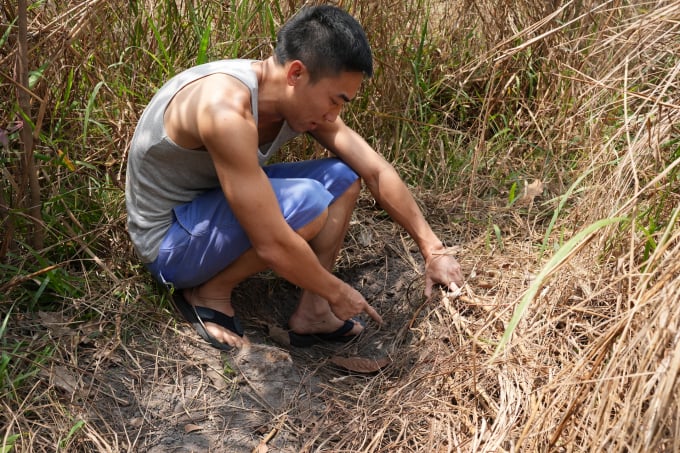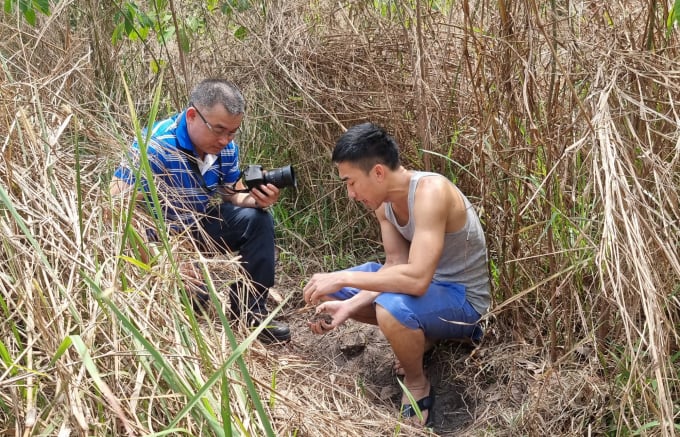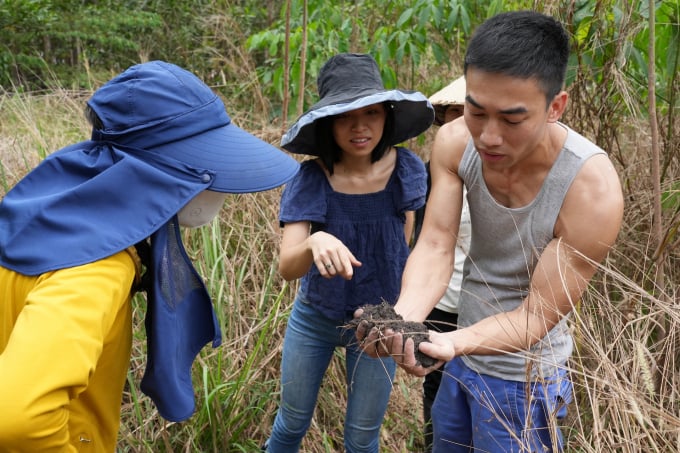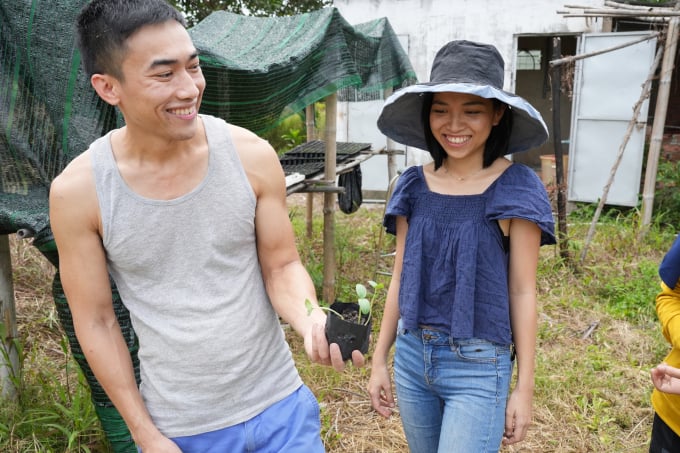May 19, 2025 | 01:37 GMT +7
May 19, 2025 | 01:37 GMT +7
Hotline: 0913.378.918
May 19, 2025 | 01:37 GMT +7
Hotline: 0913.378.918
This 1982-born man is Mike Tran (Tran Mai Anh), an American-Vietnamese, originally a technology engineer specializing in researching and manufacturing computer chips. Now he is a consultant for an organic agricultural medicine project in Binh Phuoc.

This overseas Vietnamese is very passionate about cultivated soil. Photo: Hồng Thủy.
In 2015 Mike Tran happened to meet a group of six young people who were having their first steps on the path of organic agriculture. so he "jumped" right into consulting. "I observed that those friends were still weak and lacking at that time. They did not know how to perform organic agriculture correctly, so I gave them some suggestions."
Confused by the story, I asked, “I know you are great when it comes to computer knowledge, but agriculture…” And Mike just smiled back, “When I get into something, I research it attentively. I have to be sure of it before saying or doing anything. That is also the case for agriculture. I have read many foreign documents concerning soil science, crops, and production procedures. Many of them are in-depth research materials from the USA and Europe which have been taught in universities for decades. To me agriculture knowledge is much simpler than calculations and programs in designing and manufacturing computer chips.”

His knowledge of soil and agriculture is not inferior to experts. Photo: Van Anh.
Mike Tran believed that the biggest obstacle to organic agriculture lies in having no source of clean soil. “Soil has been severely polluted for a long time because of the accumulated chemical pesticide and fertilizers residues. The land must be left to rest for at least five years like this project I am working on. Only by doing that can the soil be clean again. But it’s nowhere easy. Who would be wealthy enough to give up cultivated soil for five whole years!”
If it was not possible to let the soil rest, the only solution was to completely change the cultivation and crop care procedure. “Bio-products and micro-organisms are a reasonable replacement for chemical fertilizers and pesticides. The process may take a long time to see the results, but in a few years the soil will be clean.
"Of course it is not easy to gain the trust of farmers, especially when they only hear the theory but do not see us doing it. That's why our group roams around and persistently works with gardeners and proving it to them that it’s not all talk," Mike said.

Mike Tran was analyzing organic soil for his "students" which include agriculture technicians. Photo: Hồng Thủy.
To solidify his statements regarding clean soil, Mike Tran led us to the garden. This was an area of 6 ha, in which nearly 4 ha of land had had a full five-year rest and is about to plant the first herbs. The remaining 2 ha were waiting another 3 years for their turn.
With five fingers thrust down, Mike picked up a handful of soil and said, "This soil is relatively clean but still dry. The color is still grey."
After that, we went to the five-years area. Mike picked up another handful of soil. "Do you see the difference in this soil?", he asked. “This soil here feels moister, softer, and has more worms.” But I was not too sure how to determine whether that was organic soil.
Mike further explained, “If you want to know whether the soil is clean or not, the worm is one of the important details. Chemical farming still leaves the soil with some worms, but not in the entire area. Therefore, it is necessary to check many points on the same cultivated area, not to mention organic soil is darker in color, moister and softer.”

The sprouts are nursed with 100% organic soil by Mike Tran himself and his group according to the scientific formula. Photo: Hồng Thủy.
Taking me to the composting area, he continued to introduce the organic fertilizer. The ingredients included agricultural by-products, sawdust, organic soil, and swift’s poo. The fertilizer was said to be usable after 18 days of mixing and composting.
“We use swift’s poo because it's available, not mandatory. You can use the manure of goats, birds, chickens, and cows. However, the amount of manure mixed in is very small. Like in this pile of 1m3 I only mix in 300g of swift’s poo,” said Mike.
"Farmers in other places also make organic fertilizers, but the process is different. They would use microbial powder rather than mixing the soil like what you do here. The composting time is also quite long", I wondered. Mike quickly gave an answer, “I know about it but I don't use it because the organic soil here has billions of microorganisms. And more importantly, it's native microorganisms, much better than those "foreign" microorganisms. That preparation only has a few dozen to a few hundred microorganisms, which is far less than organic soil. That's why the composting time is longer."
After a passionate presentation on the process of making organic fertilizers, Mike Tran continued to introduce an extremely important product in the farming process listed in the "secret" category - the preparations.
“The pesticide is extracted from the stem and leaves of the oleander tree. It can treat most common pests such as mollusks, groundworms, leafworms, spiders, and slugs. We can combine it with adhesion additives extracted from natural soap. The soap usually consists of three compounds such as sea salt, coconut oil, and another additive. The antibacterial agent is extracted from 99% of natural sulfur," said Mike.
Translated by Samuel Pham

(VAN) 14 out of 35 domesticated elephants in Dak Lak province have had their living conditions improved, with 11 of them currently participating in the non-riding elephant tourism model.

(VAN) Muong Nhe Nature Reserve hopes that being upgraded to a national park will lay the foundation for forest protection efforts to be carried out in a systematic, modern, and sustainable manner.
/2025/05/16/3923-2-171845_52.jpg)
(VAN) Lower costs, higher yields, and improved soil quality are outstanding benefits that soybeans bring when integrated into the crop rotation system.

(VAN) The 'For a Green National Environment' programme aims to promote a green lifestyle, support businesses in implementing ESG practices, and turn Net Zero commitments into concrete actions.

(VAN) Cold-barn systems efficiently manage environmental and temperature conditions, which aids in the prevention of respiratory diseases in pigs and protects them from the vectors that transmit African swine fevers.

(VAN) To tackle challenges, the project 'Addressing key technical bottlenecks in the grouper supply chain in Vietnam' has been underway since 2024.

(VAN) The project 'Disease-Resilient and Sustainable Cassava Production Systems in the Mekong Region', funded by the Australian Center for International Agricultural Research (ACIAR), is being implemented from 2024 to 2028.